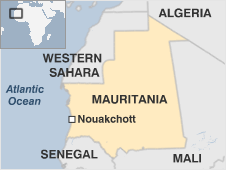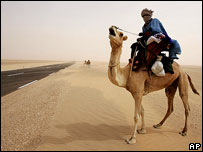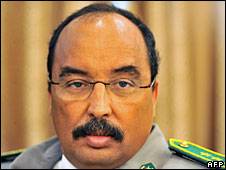 |
One of Africa's newest oil producers, Mauritania bridges the Arab Maghreb and western sub-Saharan Africa.
The largely-desert country presents a cultural contrast, with an Arab-Berber population to the north and black Africans to the south. Many of its people are nomads.
Overview
In the Middle Ages Mauritania was the cradle of the Almoravid movement, which spread Islam throughout the region and for a while controlled the Islamic part of Spain.
European traders began to show interest in Mauritania in the 15th century. France gained control of the coastal region in 1817, and in 1904 a formal French protectorate was extended over the territory.
AT-A-GLANCE
 Politics: A coup in 2005 ended President Taya's two decades of authoritarian rule; presidential polls in March 2007 marked a major step in the transition towards democracy
Economy: Mauritania depends heavily on drought-prone agriculture; its rich coastal fishing grounds are threatened by over-exploitation; offshore oil exploitation began in 2006
International: Mauritania is an ally of the US in its "war on terror" and has ties with Israel
|
Morocco opposed the country's independence in 1960 and for a time tried to absorb it. But Morocco's King Hassan II later improved ties as part of his plan to divide Western Sahara.
The eventual deal in 1976 brought more problems, though, with Mauritania coming under attack by Polisario Front guerrillas, who opposed Moroccan control of Western Sahara, and the subsequent downfall of the leader since independence - Moktar Ould Daddah - in a military coup.
Peace was agreed with the Polisario in 1979, but this in turn worsened relations with Morocco, until a detente in 1985. More recently, ties with Senegal have been strained over the use of the Senegal River, which forms the border between the two countries.
Mauritania officially banned slavery in 1981. The government has denied accusations that it is still being practised.
One of the world's poorest countries, Mauritania has pinned hopes for future prosperity on the exploitation of its offshore reserves of oil and natural gas. The Chinguetti and Tiof fields are expected to yield millions of barrels of oil.
The country forged diplomatic ties with Israel in 1999, one of three Arab nations to have done so, but suspended them in January 2009 in protest at Israel's military operation in Gaza. It closed the Israeli embassy in March.
Under former President Maaouiya Ould Sid Ahmed Taya, Mauritania was an ally of the US in its "war on terror". American special forces were despatched to train Mauritanian troops.
Facts
- Full name: The Islamic Republic of Mauritania
- Population: 3.3 million (UN, 2009)
- Capital: Nouakchott
- Area: 1.04 million sq km (398,000 sq miles)
- Major languages: Arabic (official), French, others
- Major religion: Islam
- Life expectancy: 55 years (men), 59 years (women) (UN)
- Monetary unit: 1 ouguiya = 5 khoums
- Main exports: Fish and fish products, iron ore, gold
- GNI per capita: US $840 (World Bank, 2007)
- Internet domain: .mr
- International dialling code: +222
Leaders
President: Mohamed Ould Abdelaziz

Gen Abdelaziz came to power in a coup
|
General Mohamed Ould Abdelaziz came to power by ousting his democratically-elected predecessor, President Sidi Ould Cheikh Abdallahi, in a military coup in August 2008.
Nearly a year later, he won his own democratic mandate by being elected president in elections held under an agreement with coup opponents in July 2009.
The official results gave Gen Abdelaziz 52%, well ahead of the second placed candidate, parliament speaker Messaoud Ould Boulkheir, who got 16%.
The main opposition candidates claimed the result was fabricated and merely designed to legitimise Gen Abdelaziz's military rule, but international observers said the vote had been largely free and fair. Sid'Ahmed Ould Deye, the head of the Electoral Commission, resigned after expressing his own doubts about the result.
After his win, the new president-elect said he would strengthen Mauritania's army to "fight terrorism in all its forms".
Previously serving as President Abdallahi's chief of the presidential staff, he toppled his boss when Mr Abdallahi tried to dismiss him in August 2008, amid reports of a political rift between the two men.
Gen Abdelaziz had also been instrumental in the 2005 coup that overthrew former President Maaouiya Ould Taya and installed the coup leader Ely Ould Mohamed Vall as president.
President Abdallahi's overthrow was one of 11 coups or attempted coups since independence from France in 1960. He won a presidential vote in March 2007 to become Mauritania's first democratically-elected president since independence.
Media
Although Mauritania's TV and radio stations are state-owned, privately-owned publications are permitted.
Reporters Without Borders, in its review of 2007, said press freedom was "alive and well", and "much better" than under the Taya regime.
In the same year, rights body Freedom House described the Mauritanian press as being "partly free" and noted that a June 2006 law had eliminated the need for newspapers to seek pre-publication approval from officials.
However, journals may be banned for publishing material that "undermines" Islam or is perceived to threaten national security.
The BBC is available on FM in the capital (106.9) and in the second city, Nouadhibou (102.4). Radio France Internationale is also relayed.
The press
- Chaab - state-run daily, in Arabic
- Horizons - state-run daily, in French
- Journal Officiel - government journal of record
- Le Calame - private weekly
- L'Eveil-Hebdo - private weekly
- Rajoul Echaree - private
- Akhbar Nouakchott - private, Arabic daily
- Nouakchott Info - private, French-language daily
Television
- Television de Mauritanie (TVM) - state-run, programmes in Arabic and French
Radio
• Radio Mauritanie - state-run, programmes in Arabic and French
News agency
- Mauritanian News Agency (AMI) - state-run
AFRICA |
ASIA-PACIFIC |
AMERICAS
|
EUROPE | MIDDLEEAST | SOUTHASIA
Mauritania
Mauritius
Morocco
Mozambique
Namibia
Niger
Nigeria
Republic-of-congo
Rwanda
Sao-tome-and-principe
Senegal
Seychelles
Sierra-leone
Somalia
South-africa
Sudan
Swaziland
Tanzania
The-gambia
Togo
Tunisia
Uganda
zambia
Zimbabwe
Australia
Brunei
Burma
Cambodia
China
East-timor
Fiji
Indonesia
Japan
Kazakhstan
Kiribati
Kyrgyzstan
Laos
Malaysia
Marshall-islands
Micronesia
Mongolia
Nauru
New-zealand
North-korea
Palau
Papua-new-guinea
Samoa
Singapore
Solomon-islands
South-korea
Taiwan
Tajikistan
Thailand
The-philippines
Tonga
Turkmenistan
Tuvalu
Uzbekistan
Vanuatu
Vietnam
Antigua-and-barbuda
Argentina
Bahamas
Barbados
Belize
Bolivia
Brazil
Canada
Chile
Colombia
Costa-rica
Cuba
Dominica
Dominican-republic
Ecuador
El-salvador
Grenada
Guatemala
GuyanaHaiti
Honduras
Jamaica
Mexico
Nicaragua
Panama
Paraguay
Peru
St-kitts-and-nevis
St-lucia
St-vincent-and-the-grenadines
Suriname
Trinidad-and-tobago
United-states-of-america
Uruguay
Venezuela
Albania
Andorra
Armenia
Austria
Azerbaijan
Belarus
Belgium
Bosnia-hercegovina
Bulgaria
Croatia
Cyprus
Czech-republic
Denmark
Estonia
Finland
France
Georgia
Germany
Greece
Hungary
Iceland
Ireland
Italy
Latvia
Liechtenstein
Lithuania
Luxembourg
Macedonia
Malta
Moldova
Monaco
Montenegro
Norway
Poland
Portugal
Russia
San-marino
Serbia
Slovakia
Slovenia
Spain
Sweden
Switzerland
The-netherlands
Turkey
Ukraine
United-kingdom
Vatican
Algeria
Egypt
Iran
Iraq
Israel-and-palestinian-territories
Jordan
Kuwait
Lebanon
Libya
Mauritania
Oman
Saudi-arabia
Sudan
Syria
Tunisia
United-arab-emirates
Yemen
Afghanistan
Bangladesh
Bhutan
India
Nepal
Pakistan
Sri-Lanka
The-Maldives

